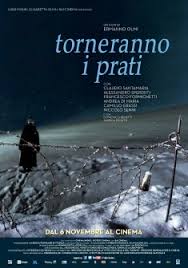
TORNERANNO I PRATI/GREENERY WILL RETURN
Italy, 2015, 78 minutes, Colour.
Directed by Ermano Olmi.
Ermanno Olmi began directing films in 1958 and has had a very successful career in his native Italy, a focus on Italian life, on Italian traditions, the great values in Italian life and culture.
In the 1970s, he made two films which are considered masterpieces, The Tree of Wooden Clogs and The Legend of the Holy Drinker.
In the years of the 21st century, there were reports that this would be the last film from Olmi, then there was another, and another.
This time this could be his last part he has made a brief film, effective nonetheless. He takes a military outpost on the border between Italy and Austria during World War I. It is winter and the men have dug in, surviving in a trench with accommodation as well as offices for the military authorities. The men dig paths so that rations can be brought in. There are wooden barriers, wire barriers. Flares leaders go up at night.
There is a focus on the men, the responsibility of the officers, the wounded and their hallucinations, the care from the other man. Officials make a decision which the men consider wrong, that a scout needs to go out from the trench to get information about the attack. One man goes out, promised 10 lire for his efforts, but he is shot almost immediately. Another volunteers but strips himself of his rank and then shoots himself.
Then begin the bombardments, exceedingly heavy, and the decision is made that the men retreat. The new young officer makes decisions, the men go down the hill, others remaining to care for the wounded.
The Chaplain is glimpsed, giving blessings to the sick, their burial, for those retreating – and some dialogue criticising the role of the absent God, the wicked God.
Early in the film, a soldier sings, bringing some soothing to the men. Later the young Lieutenant asks the singer to sing again but he refuses, saying that it is not in the regulations and that singing is for happy situations.
The film is reminiscent of such films as Paths of Glory, the picture of warfare, the ordinary men, and the bad decisions of officers. There is a pessimistic ending the soldier commenting that all this activity and heroism will be forgotten.
1. World War I, 100 years later, the roles of Italy and Austria?
2. The work of the director, over 60 years making films, the scope of his films, humanity?
3. This film as small-scale, an episode in war, the harshness of war, the dead and wounded, the ultimate retreat?
4. The visuals, the muted colour, much seeming black and white? The outpost, in the snow, the trees, the special tree, the larch, and it being imagined as gold, then and burning? The wires and posts? The interiors, the trenches, accommodation, offices, the rations?
5. The emotion of the musical score?
6. The overview, the snow, shovelling a path for the rations? The soldier singing, the response of the men, encouraging him?
7. The situation at the front, winter, the bombardment, the snipers, orders and communications? Persuading men to volunteer, the family man and the promise of 10 lire, his almost immediately dying? The man letting go of his rank, shooting himself? The critique of the orders?
8. The officer, his decision, the young lieutenant, responsibilities? Especially for the retreat, commanding the Sgt to help the men down? His wanting the soldier to sing, but its not being part of regulations? Singing for those who were happy?
9. The fever, illness, hallucinations? The soldiers and their care for one another, concern?
10. The vividness of the bombardment, the flares, the amount of destruction, the dead and wounded, the digging of the mine under the outpost?
11. The role of the chaplain, blessing the men, at the bombardment and the retreat, the funerals? The comments about God, the wicked God, God’s absence, God being where he was sought?
12. The retreat, the soldiers going down the hill in file?
13. Those remaining, tending the wounded?
14. Ordinary men, forced into war, wanting to go home? The effects, the trauma, taking the war back with them? Their service to their country?
15. The final comment, the sufferings of war? But then being forgotten?